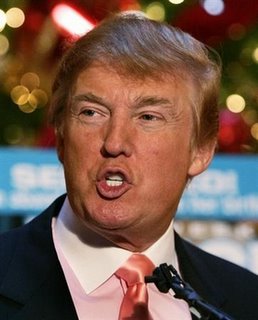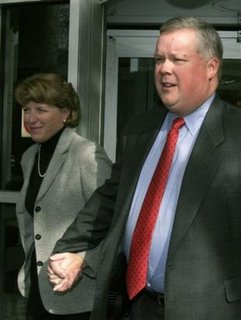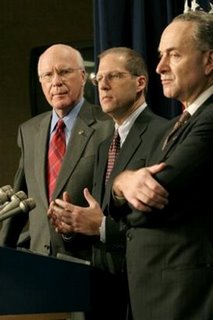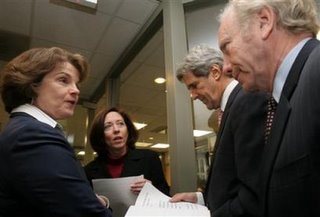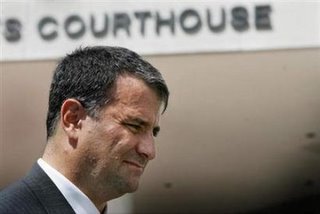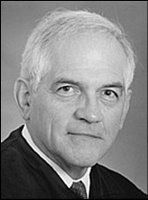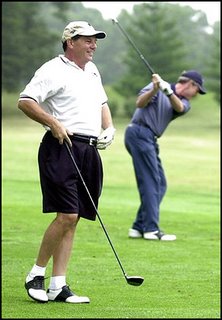Folks, it is time for another episode of
The Tom DeLay Comedy Hour! This is from
The Washington Post:The U.S. Family Network, a public advocacy group that operated in the 1990s with close ties to Rep. Tom DeLay and claimed to be a nationwide grass-roots organization, was funded almost entirely by corporations linked to embattled lobbyist Jack Abramoff, according to tax records and former associates of the group.
 Tom DeLay
Tom DeLay
During its five-year existence, the U.S. Family Network raised $2.5 million but kept its donor list secret. The list, obtained by The Washington Post, shows that $1 million of its revenue came in a single 1998 check from a now-defunct London law firm whose former partners would not identify the money's origins.
Two former associates of Edwin A. Buckham, the congressman's former chief of staff and the organizer of the U.S. Family Network, said Buckham told them the funds came from Russian oil and gas executives. Abramoff had been working closely with two such Russian energy executives on their Washington agenda, and the lobbyist and Buckham had helped organize a 1997 Moscow visit by DeLay (R-Tex.).
The former president of the U.S. Family Network said Buckham told him that Russians contributed $1 million to the group in 1998 specifically to influence DeLay's vote on legislation the International Monetary Fund needed to finance a bailout of the collapsing Russian economy.
Whatever the real motive for the contribution of $1 million -- a sum not prohibited by law but extraordinary for a small, nonprofit group -- the steady stream of corporate payments detailed on the donor list makes it clear that Abramoff's long-standing alliance with DeLay was sealed by a much more extensive web of financial ties than previously known.
 Jack Abramoff
Jack Abramoff
Records and interviews also illuminate the mixture of influence and illusion that surrounded the U.S. Family Network. Despite the group's avowed purpose, records show it did little to promote conservative ideas through grass-roots advocacy. The money it raised came from businesses with no demonstrated interest in the conservative "moral fitness" agenda that was the group's professed aim.
In addition to the million-dollar payment involving the London law firm, for example, half a million dollars was donated to the U.S. Family Network by the owners of textile companies in the Mariana Islands in the Pacific, according to the tax records. The textile owners -- with Abramoff's help -- solicited and received DeLay's public commitment to block legislation that would boost their labor costs, according to Abramoff associates, one of the owners and a DeLay speech in 1997.
A quarter of a million dollars was donated over two years by the Mississippi Band of Choctaw Indians, Abramoff's largest lobbying client, which counted DeLay as an ally in fighting legislation allowing the taxation of its gambling revenue.
The records, other documents and interviews call into question the very purpose of the U.S. Family Network, which functioned mostly by collecting funds from domestic and foreign businesses whose interests coincided with DeLay's activities while he was serving as House majority whip from 1995 to 2002, and as majority leader from 2002 until the end of September.
In other words, the U.S. Family Network was set up as a slush fund for Tom DeLay. The U.S. Family Network was marketed as a grass-roots campaign organization, but its real purpose was to solicit lobbying funds from clients. Think about it for a moment. Almost half of the monies raised by the U.S. Family Network came from a single defunct London law firm. What the heck was that law firm getting for that kind of money? And who was on that law firm's client list? Were the Russian oil executives responsible for moving $1 million into the London law firm, then having the law firm transfer that money into the U.S. Family Network as a payoff for DeLay's vote on approving the IMF bailout to the Russian government? Then there's the half million payment to the U.S. Family Network by textile companies in the Marianas--and we know how DeLay voted regarding legislation to increase wages for Marianas' textile workers. Of course, I haven't really gotten into Abramoff's involvement in this scam. Abramoff was the salesman here--selling his lobbying services to the Marianas' textile companies, to the Choctaw Indians (who donated a quarter million to the Family Network), and possibly to the Russian oil execs. Abramoff was selling Tom DeLay's vote in congressional legislation to the highest bidder. The money coming in for these sales were placed into organizations, which basically acted as fronts to do as DeLay pleased. Remember
Texans for a Republican Majority? That was a simple front to launder corporate campaign contributions from the national Republican Party to Texas state and House GOP candidates campaign coffers, circumventing Texas election laws. The U.S. Family Network is nothing more than a slush fund.
So what was the U.S. Family Network paying out? Consider this:
After the group was formed in 1996, its director told the Internal Revenue Service that its goal was to advocate policies favorable for "economic growth and prosperity, social improvement, moral fitness, and the general well-being of the United States." DeLay, in a 1999 fundraising letter, called the group "a powerful nationwide organization dedicated to restoring our government to citizen control" by mobilizing grass-roots citizen support.
But the records show that the tiny U.S. Family Network, which never had more than one full-time staff member, spent comparatively little money on public advocacy or education projects. Although established as a nonprofit organization, it paid hundreds of thousands of dollars in fees to Buckham and his lobbying firm, Alexander Strategy Group.
In other words, the slush fund was used to enrich both DeLay and Buckam's pockets. Buckham was formerly DeLay's chief of staff, before he set out on his own as a lobbyist, creating the Alexander Strategy Group. DeLay's wife worked for the Alexander Strategy Group:
There is no evidence DeLay received a direct financial benefit, but Buckham's firm employed DeLay's wife, Christine, and paid her a salary of at least $3,200 each month for three of the years the group existed. Richard Cullen, DeLay's attorney, has said that the pay was compensation for lists Christine DeLay supplied to Buckham of lawmakers' favorite charities, and that it was appropriate under House rules and election law.
The U.S. Family Network also funded some other activities. Consider this:
Some of the U.S. Family Network's revenue was used to pay for radio ads attacking vulnerable Democratic lawmakers in 1999; other funds were used to finance the cash purchase of a townhouse three blocks from DeLay's congressional office. DeLay's associates at the time called it "the Safe House."
DeLay made his own fundraising telephone pitches from the townhouse's second-floor master suite every few weeks, according to two former associates. Other rooms in the townhouse were used by Alexander Strategy Group, Buckham's newly formed lobbying firm, and Americans for a Republican Majority (ARMPAC), DeLay's leadership committee.
They paid modest rent to the U.S. Family Network, which occupied a single small room in the back.
The U.S. Family Network was nothing more than a
slush fund.Now we come to the DeLay / Russian oil executives connection:
Nine months before the June 25, 1998, payment of $1 million by the London law firm James & Sarch Co., as recorded in the tax forms, Buckham and DeLay were the dinner guests in Moscow of Marina Nevskaya and Alexander Koulakovsky of the oil firm Naftasib, which in promotional literature counted as its principal clients the Ministry of Defense and the Ministry of Interior.
Their other dining companions were Abramoff and Washington lawyer Julius "Jay" Kaplan, whose lobbying firms collected $440,000 in 1997 and 1998 from an obscure Bahamian firm that helped organize and indirectly pay for the DeLay trip, in conjunction with the Russians. In disclosure forms, the stated purpose of the lobbying was to promote the policies of the Russian government.
So DeLay, Abramoff, and Buckham were having dinner with two top Russian oil executives Nevskaya and Koulakovsky. Nevskaya and Koulakovsky not only run the oil firm Naftasib, but also have connections within the Ministries of Defense and Interior. And since both executives are involved in Naftasib and the Russian government, they are certainly willing to lobby the U.S. Congress to promote policies that would affect the Russian government in ways to benefit themselves and Naftasib. Continuing on:
Former Abramoff associates and documents in the hands of federal prosecutors state that Nevskaya and Koulakovsky sought Abramoff's help at the time in securing various favors from the U.S. government, including congressional earmarks or federal grants for their modular-home construction firm near Moscow and the construction of a fossil-fuel plant in Israel. None appears to have been obtained by their firm.
Former DeLay employees say Koulakovsky and Nevskaya met with him on multiple occasions. The Russians also frequently used Abramoff's skyboxes at local sports stadiums -- as did Kaplan, according to sources and a 2001 e-mail Abramoff wrote to another client.
Three sources familiar with Abramoff's activities on their behalf say that the two Russians -- who knew the head of the Russian energy giant Gazprom and had invested heavily in that firm -- partly wanted just to be seen with a prominent American politician as a way of bolstering their credibility with the Russian government and their safety on Moscow's streets. The Russian oil and gas business at the time had a Wild West character, and its executives worried about extortion and kidnapping threats. The anxieties of Nevskaya and Koulakovsky were not hidden; like many other business people, they traveled in Moscow with guards armed with machine guns.
A former Abramoff associate said the two executives "wanted to contribute to DeLay" and clearly had the resources to do it. At one point, Koulakovsky asked during a dinner in Moscow "what would happen if the DeLays woke up one morning" and found a luxury car in their front driveway, the former associate said. They were told the DeLays "would go to jail and you would go to jail."
The Russians certainly know how to bribe government officials, although by a rather crude means. Here's a somewhat rather slicker way to bribe a government official:
The tax form states that the $1 million came by check on June 25, 1998, from "Nations Corp, James & Sarch co." The Washington Post checked with the listed executives of Texas and Florida firms that have names similar to Nations Corp, and they said they had no connection to any such payment.
James & Sarch Co. was dissolved in May 2000, but two former partners said they recalled hearing the names of the Russians at their office. Asked if the firm represented them, former partner Philip McGuirk at first said "it may ring a bell," but later he faxed a statement that he could say no more because confidentiality practices prevent him "from disclosing any information regarding the affairs of a client (or former client)."
Nevskaya said in the e-mail yesterday, however, that "neither Naftasib nor the principals you mentioned have ever been represented by a London law firm that you name as James & Sarch Co." She also said that Naftasib and its principals did not pay $1 million to the firm, and denied knowing about the transaction.
Two former Buckham associates said that he told them years ago not only that the $1 million donation was solicited from Russian oil and gas executives, but also that the initial plan was for the donation to be made via a delivery of cash to be picked up at a Washington area airport.
One of the former associates, a Frederick, Md., pastor named Christopher Geeslin who served as the U.S. Family Network's director or president from 1998 to 2001, said Buckham further told him in 1999 that the payment was meant to influence DeLay's vote in 1998 on legislation that helped make it possible for the IMF to bail out the faltering Russian economy and the wealthy investors there.
"Ed told me, 'This is the way things work in Washington,' " Geeslin said. "He said the Russians wanted to give the money first in cash." Buckham, he said, orchestrated all the group's fundraising and spending and rarely informed the board about the details.
So, the Russians first wanted to give a luxury car to DeLay. But since this overt form of bribery was against U.S. law, they had to find a different means. Now we get this scam where a $1 million check was sent to the U.S. Family Network, from a non-existent company "Nations Corp." The law firm representing "Nations Corp." was James and Sarch, which was apparently representing the two Russian oil executives, according to the former partners of James and Sarch. So where did the money come from?
The more I read of this story, the more complications, lies, and disinformation I see in this whole bribery scam. The fact that Buckham told Geeslin that this $1 million payment from "Nations Corp." was meant to
"influence DeLay's vote in 1998 on legislation that helped make it possible for the IMF to bail out the faltering Russian economy and the wealthy investors there," shows the arrogance these people have in abusing power and the political system of our country. "That is the way things work in Washington." It is incredible at how much hubris and arrogance these people have, regarding the law, regarding how this system can be subverted for their own self-interests.
There is so much more to this DeLay-Abramoff Money Trail. The Post also follows the Choctaw Indian gambling casino, and their connection with U.S. Family Network. The money connection there goes from the Choctaw tribe, through Buckham's Alexander Strategy Group, and into the Family Network. And in return, the Choctaws were getting DeLay's vote, and Congress, to stop rival indian tribes from building casinos in Alabama, Mississippi, and Louisiana. But I'm going to stop here. I would recommend that you read the Post story very carefully--perhaps even two or three times, to fully digest and understand this complicated money trail.
It is incredible.
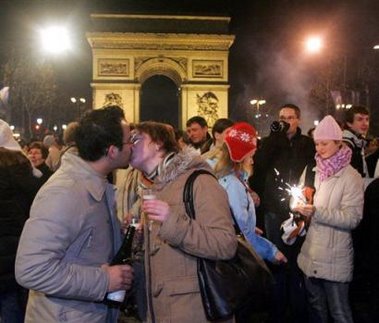 Revellers celebrate the New Year on the Champs Elysees in Paris early Sunday Jan. 1, 2006. (AP PHOTO/Remy de la Mauviniere)
Revellers celebrate the New Year on the Champs Elysees in Paris early Sunday Jan. 1, 2006. (AP PHOTO/Remy de la Mauviniere) Fireworks flash above Sydney Harbour bridge and Opera House during New Year celebrations in Australia's largest city, Sydney, early Sunday, Jan. 1, 2006. (AP Photo/Rick Rycroft)
Fireworks flash above Sydney Harbour bridge and Opera House during New Year celebrations in Australia's largest city, Sydney, early Sunday, Jan. 1, 2006. (AP Photo/Rick Rycroft) Girls party in Sydney during the annual fireworks display to celebrate the New Year in Sydney, Australia, Sunday, Jan. 1, 2006. (AP Photo/Rob Griffith)
Girls party in Sydney during the annual fireworks display to celebrate the New Year in Sydney, Australia, Sunday, Jan. 1, 2006. (AP Photo/Rob Griffith)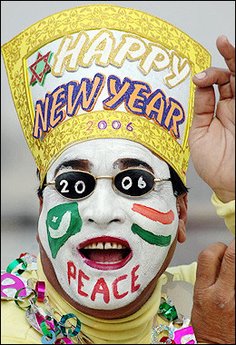 Indian man Kamlesh Nanda wears make up featuring a display Indian and Pakistani flags and a 'Happy New Year' hat in Amritsar, as he welcomes in the New Year 2006. Fireworks lit up the sky from Sydney to Hong Kong as the cities rang in 2006, kickstarting a night of celebration around the world as revellers bid farewell to a year scarred by violence and natural disasters.(AFP/Narinder Nanu)
Indian man Kamlesh Nanda wears make up featuring a display Indian and Pakistani flags and a 'Happy New Year' hat in Amritsar, as he welcomes in the New Year 2006. Fireworks lit up the sky from Sydney to Hong Kong as the cities rang in 2006, kickstarting a night of celebration around the world as revellers bid farewell to a year scarred by violence and natural disasters.(AFP/Narinder Nanu) A Chinese woman prays in front of statues of Buddha as she celebrates the start of the new year Jan. 1, 2006 at Longhua Temple in Shanghai, China. According to the twelve signs of the Chinese zodiac, the year 2006 marks the year of the dog. (AP Photo)
A Chinese woman prays in front of statues of Buddha as she celebrates the start of the new year Jan. 1, 2006 at Longhua Temple in Shanghai, China. According to the twelve signs of the Chinese zodiac, the year 2006 marks the year of the dog. (AP Photo) Indonesian children play with clowns to celebrate the New Year in Jakarta on January 1, 2006. Indonesia authorities are gearing up to prevent possible terror attacks in the world's most populous Muslim nation during the New Year's celebrations. REUTERS/Dadang Tri
Indonesian children play with clowns to celebrate the New Year in Jakarta on January 1, 2006. Indonesia authorities are gearing up to prevent possible terror attacks in the world's most populous Muslim nation during the New Year's celebrations. REUTERS/Dadang Tri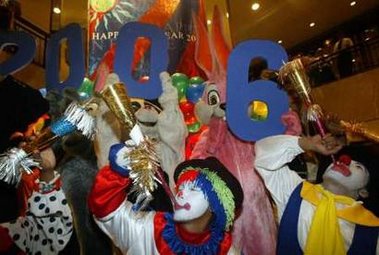 Clowns blow paper trumpets to celebrate the New Year in Jakarta on January 1, 2006. REUTERS/Dadang Tri
Clowns blow paper trumpets to celebrate the New Year in Jakarta on January 1, 2006. REUTERS/Dadang Tri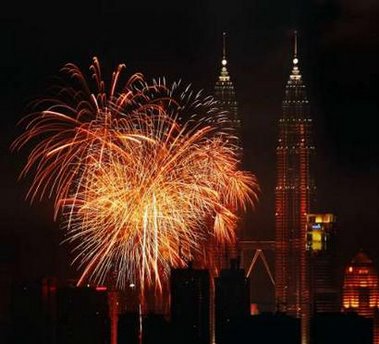 Fireworks explode over the Malaysia's Petronas Twin Towers at midnight in Kuala Lumpur January 1, 2006. Thousands of Malaysians gathered at the foot of the country's landmark to celebrate the coming of the new year. REUTERS/Bazuki Muhammad
Fireworks explode over the Malaysia's Petronas Twin Towers at midnight in Kuala Lumpur January 1, 2006. Thousands of Malaysians gathered at the foot of the country's landmark to celebrate the coming of the new year. REUTERS/Bazuki Muhammad Two women celebrate as they welcome in the New Year in Time Square, in Hong Kong, Saturday, Jan. 1, 2006. (AP Photo / Kin Cheung)
Two women celebrate as they welcome in the New Year in Time Square, in Hong Kong, Saturday, Jan. 1, 2006. (AP Photo / Kin Cheung) A South Korean Christian weeps as she prays for reunification during a service to celebrate the New Year at Imjingak near the border village of the Panmunjom, north of Seoul, South Korea, Sunday, Jan. 1, 2006. About 5,000 participators prayed for a peaceful solution to the rising tension over North Korea's nuclear weapons programs and hope for early reunification of the divided Koreas. (AP Photo/Ahn Young-joon).
A South Korean Christian weeps as she prays for reunification during a service to celebrate the New Year at Imjingak near the border village of the Panmunjom, north of Seoul, South Korea, Sunday, Jan. 1, 2006. About 5,000 participators prayed for a peaceful solution to the rising tension over North Korea's nuclear weapons programs and hope for early reunification of the divided Koreas. (AP Photo/Ahn Young-joon).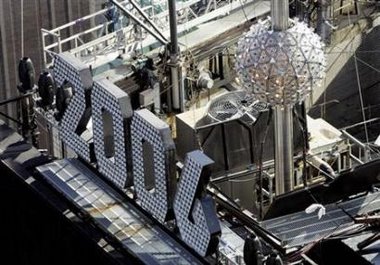 The Times Square New Year's Eve ball lights up during a test drop in New York December 30, 2005. The Times Square New Year's Eve ball lights up during a test drop in New York December 30, 2005. At best, New Year's Eve is not only a time to celebrate another year passing, but also a time to see great music. New York, Los Angeles and Las Vegas will be hosting the biggest names in pop and rock, and there are a slew of acts taking to stages around America to welcome in 2006. (Shannon Stapleton/Reuters)
The Times Square New Year's Eve ball lights up during a test drop in New York December 30, 2005. The Times Square New Year's Eve ball lights up during a test drop in New York December 30, 2005. At best, New Year's Eve is not only a time to celebrate another year passing, but also a time to see great music. New York, Los Angeles and Las Vegas will be hosting the biggest names in pop and rock, and there are a slew of acts taking to stages around America to welcome in 2006. (Shannon Stapleton/Reuters) Emma Henriksen, 17, of Wisconsin, inflates balloons in New York's Times Square Friday, Dec. 30, 2005 in preparation for the New Year's Eve celebration. Tens of thousands of balloons will be distributed to revelers welcoming in 2006. (AP Photo/Shiho Fukada)
Emma Henriksen, 17, of Wisconsin, inflates balloons in New York's Times Square Friday, Dec. 30, 2005 in preparation for the New Year's Eve celebration. Tens of thousands of balloons will be distributed to revelers welcoming in 2006. (AP Photo/Shiho Fukada) David Pielo installs one of the 72 new Waterford Crystal triangles to the exterior of the Times Square New Year's Eve ball in New York December 27, 2005. The six-feet in diameter, 1,070-pound lighted crystal ball will serve as the centerpiece for the Times Square 2006 celebration. REUTERS/Shannon Stapleton
David Pielo installs one of the 72 new Waterford Crystal triangles to the exterior of the Times Square New Year's Eve ball in New York December 27, 2005. The six-feet in diameter, 1,070-pound lighted crystal ball will serve as the centerpiece for the Times Square 2006 celebration. REUTERS/Shannon Stapleton




